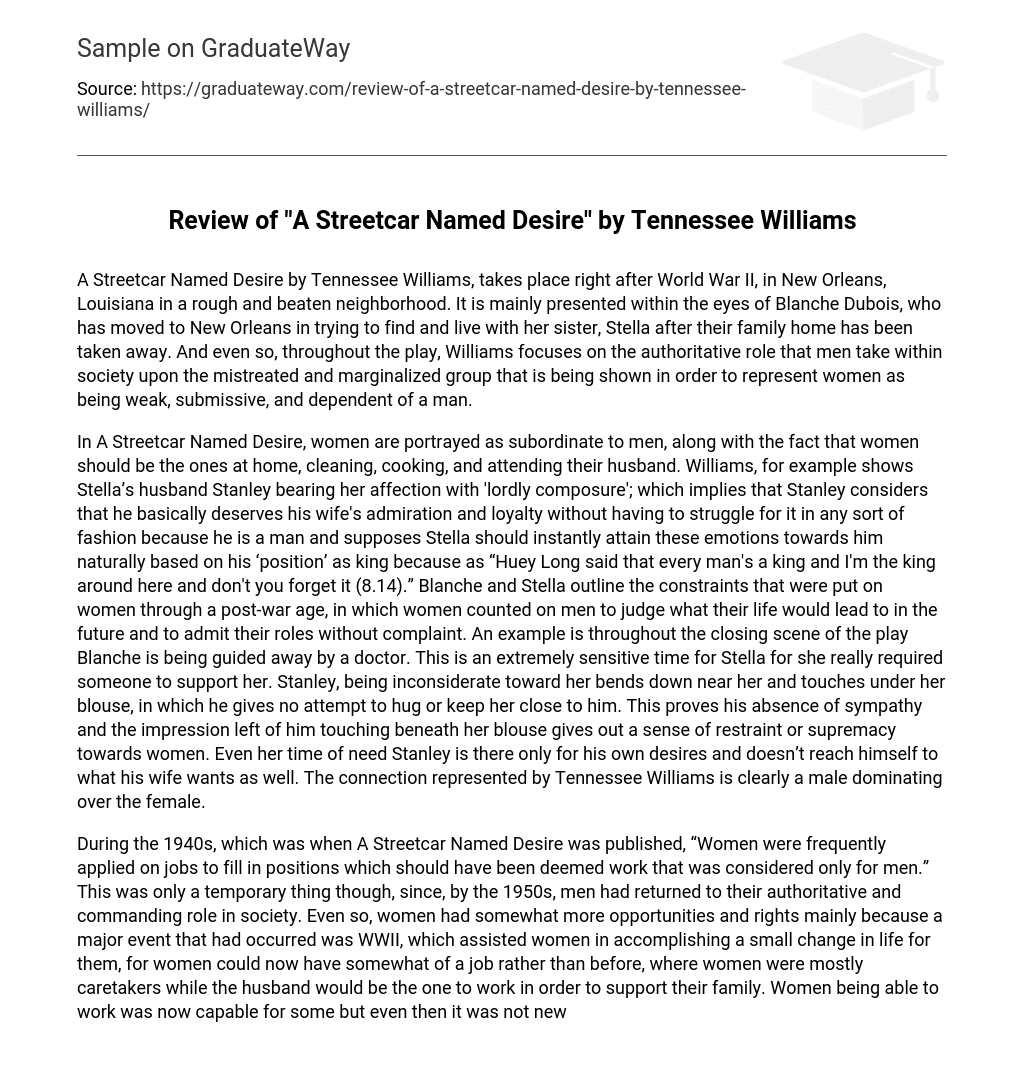A Streetcar Named Desire by Tennessee Williams, takes place right after World War II, in New Orleans, Louisiana in a rough and beaten neighborhood. It is mainly presented within the eyes of Blanche Dubois, who has moved to New Orleans in trying to find and live with her sister, Stella after their family home has been taken away. And even so, throughout the play, Williams focuses on the authoritative role that men take within society upon the mistreated and marginalized group that is being shown in order to represent women as being weak, submissive, and dependent of a man.
In A Streetcar Named Desire, women are portrayed as subordinate to men, along with the fact that women should be the ones at home, cleaning, cooking, and attending their husband. Williams, for example shows Stella’s husband Stanley bearing her affection with ‘lordly composure’; which implies that Stanley considers that he basically deserves his wife’s admiration and loyalty without having to struggle for it in any sort of fashion because he is a man and supposes Stella should instantly attain these emotions towards him naturally based on his ‘position’ as king because as “Huey Long said that every man’s a king and I’m the king around here and don’t you forget it (8.14).” Blanche and Stella outline the constraints that were put on women through a post-war age, in which women counted on men to judge what their life would lead to in the future and to admit their roles without complaint. An example is throughout the closing scene of the play Blanche is being guided away by a doctor. This is an extremely sensitive time for Stella for she really required someone to support her. Stanley, being inconsiderate toward her bends down near her and touches under her blouse, in which he gives no attempt to hug or keep her close to him. This proves his absence of sympathy and the impression left of him touching beneath her blouse gives out a sense of restraint or supremacy towards women. Even her time of need Stanley is there only for his own desires and doesn’t reach himself to what his wife wants as well. The connection represented by Tennessee Williams is clearly a male dominating over the female.
During the 1940s, which was when A Streetcar Named Desire was published, “Women were frequently applied on jobs to fill in positions which should have been deemed work that was considered only for men.” This was only a temporary thing though, since, by the 1950s, men had returned to their authoritative and commanding role in society. Even so, women had somewhat more opportunities and rights mainly because a major event that had occurred was WWII, which assisted women in accomplishing a small change in life for them, for women could now have somewhat of a job rather than before, where women were mostly caretakers while the husband would be the one to work in order to support their family. Women being able to work was now capable for some but even then it was not new to women. Majority of women have somewhat worked as well, particularly minority and women who were considered the lowest of class. Nevertheless, the social division of labor or workers in general by gender ideally set women of a higher class to remain at home and the men to be the ones in the workforce. Also, because of multiple layoffs during the Depression, the majority of people, specifically men, were severely opposing women with jobs because they perceived it as women stealing men’s roles and keeping them from having work. But during the 1940s, the growth in suffrage campaigns start occurring more than ever in which it gave chances for women to have some rights or social changes in society but at the same time they were struggling to attain political or social equality in general. Basically, women were still being portrayed as powerless, gentle, and submissive, limited to a discriminatory society that detached them from the harsh reality.
Such marginalization of the group an is clearly shown through the ads that were run at the time of A Streetcar Named Desire. An example would be an ad for a product called Lysol Disinfectant which was mainly aimed at women’s hygiene, but the product wasn’t the problem, rather it was the was that women were being depicted as or expected to be. Throughout the ad, there showed 5 pictures of women and each consisted of what was typical of a woman to behave as, such as how a woman was to be represented as “cheerful. She never nagged, or moped or wept’” which leads to the conclusion that women weren’t capable of holding an opinion nor could they be given choice in anything, for they never “nagged or moped.” Another factor was that women were depicted to be “affectionate. She was warm-hearted and tender,” which can connect back to how in scene 4 of A Streetcar Named Desire Blanche had told Stella that she is only with Stanley because of his physicality and intimacy and that is the only reason why she’s passionate about him because she needs a man in her life.





